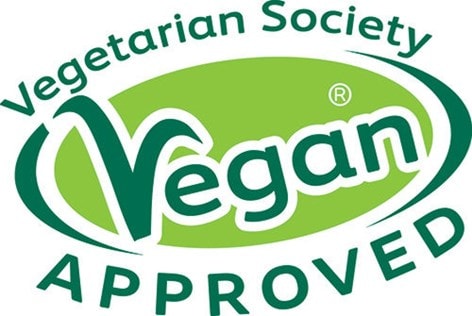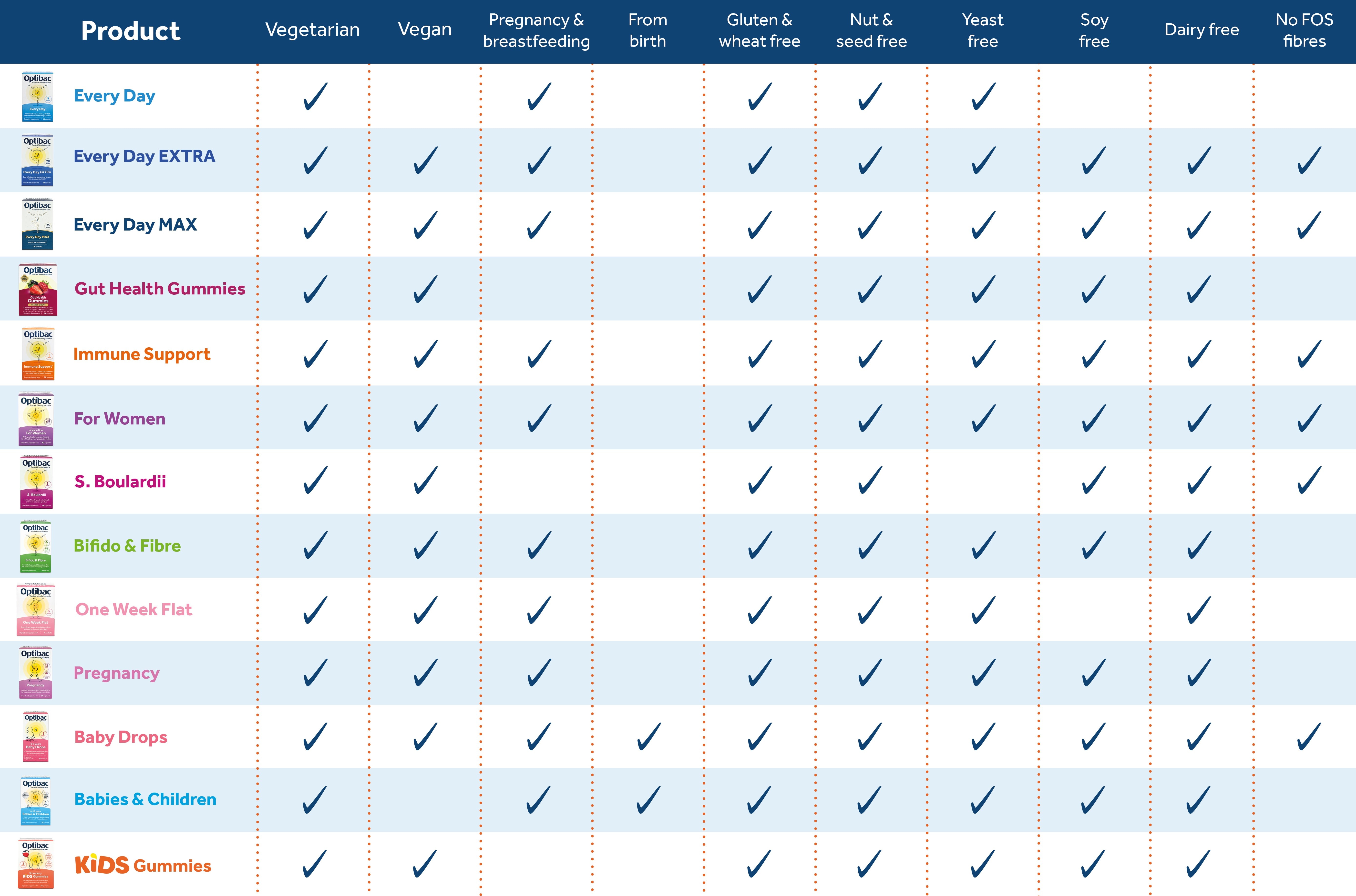You're away from FREE US delivery Free US delivery (applied at checkout) on orders over $60.00
You have qualified for Free US delivery
Suitability
Vegan probiotics: which Optibac supplements are best for vegans?
All Optibac Probiotics supplements are vegetarian and approved by the Vegetarian Society. Most of our live cultures are vegan and dairy-free too. Our FAQ explains everything you need to know about vegan probiotics.
There are currently around 1.5 million1 people in the UK and around 9.7 million2 in the US who class themselves as vegan, with these numbers on the increase. Vegans and vegetarians are predicted to make up a quarter of the British population in 2025, motivated by concerns about health, factory farming and animal cruelty, and the environment. Consequently, there's a huge interest in vegan supplements, including vegan probiotics.
But are probiotics vegan? This article aims to answer all of your questions about taking vegan live cultures:
In this article we will look at:
- Which Optibac Probiotics supplements are vegan?
- What are vegan probiotics?
- Which are the best vegan probiotic strains?
- How do vegans get probiotics from their diet?
- Do vegans need probiotic supplements?
- 7 of the best vegan fermented foods

Which Optibac Probiotics supplements are vegan?
Becoming vegan can be bewildering, as there are so many hidden animal products in foods and drinks. Live probiotic cultures are often associated with dairy produce, so many vegans ask us if friendly bacteria are also vegan-friendly! The good news is that vegans can have probiotics - all of our products are suitable for vegetarians, and the products listed below are also suitable for vegans and will be labelled as vegan::
- Kids Gummies
- Gut Health Gummies
- Every Day EXTRA
- Every Day MAX
- For Women
- Immune Support
- Bifido & Fibre
- Saccharomyces boulardii
- Baby Drops
- Pregnancy
- One Week Flat
Shop all our vegan probiotic supplements.
The rest of the Optibac Probiotics range may contain tiny traces of dairy, as some of our probiotic strains are cultured on a base of organic dairy & soy before being extracted. Although these products do not contain dairy as an ingredient, they are not suitable for people strictly adhering to a vegan diet. Read more about this here: Which Optibac Probiotics are lactose & dairy free?
What are vegan probiotics?
Probiotics can only be classed as vegan when they are fermented (or grown) on a medium that does not contain any animal derived ingredients, typically dairy in the fermentation of probiotics. Whilst none of the dairy growing medium will be added to the end product, the fact that the bacteria have been grown on a dairy ‘substrate’ means that we cannot rule out possible trace amounts in the finished product.
If you want a purely vegan probiotic supplement, choose supplements labelled as vegan. All our certified vegan supplements have been grown on a medium that does not contain dairy or other animal-derived ingredients. These supplements have the ‘vegan approved’ certification from the Vegetarian Society and do not use or contain any other animal products.
Some may wonder why we don’t always use a dairy-free growing medium for all our supplements, to enable our whole range to be vegan. Whilst this may sound simple, the fact is that some strains of probiotics just do not grow well on a plant-based medium. Just like you or I have our favourite foods, so do bacteria! But most probiotic strains are happy to ferment plant-based substrates, and we can still offer a wide range of vegan probiotic supplements.
Which are the best vegan friendly probiotic strains?
In terms of whether certain strains of bacteria are better for vegans than others: there has been some debate as to whether the microbiome of vegans is different to those who eat animal products3, and therefore will they need specific strains of friendly bacteria? There's no evidence to highlight any particular probiotic strains for vegans, but certainly eating a healthy vegan diet, full of natural plant fibres and natural vegan fermented foods, will naturally encourage strains of live cultures in the gut which like to ferment plant-based foods. The microbiome adapts: find out more about how a vegan or vegetarian diet impacts your gut over in the Probiotics Learning Lab. Certainly a healthy vegan diet will be typically full of natural plant fibres and natural vegan fermented foods, and these will naturally encourage, or contain, strains of bacteria which like to ferment plant-based foods.
But when it comes to choosing a vegan supplement, the answer is simple: the best probiotic strains for vegans are the ones which have been researched for their individual needs, especially if they have health concerns. Read more about how different strains have different properties. Thankfully, there are numerous highly researched vegan strains so it is easy the one which suits your needs best.
Some people worry about whether vegan probiotics are as effective, but be reassured that in fact some of the world’s most highly researched live cultures strains are classed as vegan. The following examples are some of the most well-known and prestigious probiotic strains in use today - they are all vegan and can be found in the Optibac Probiotics range:
- Saccharomyces boulardii - a world renowned probiotic yeast, popular for occasional diarrhoea*
- Lactobacillus acidophilus NCFM® - the world's most researched strain of L. acidophilus
- Lactobacillus rhamnosus GR-1® - extensively researched for vaginal health*
- Lactobacillus paracasei CASEI 431® - researched in gold standard trials for immune support*
- Bifidobacterium breve M-16V® - researched in thousands of infants and children
- Bacillus coagulans Unique IS-2 - used in gummies for immune and digestive support*
These are just a few examples of the high quality vegan strains in our range, but all of the Optibac Probiotics strains are proven to reach the gut or vagina alive. If you're not sure which are the best vegan probiotics for you, contact our Nutrition Team for free advice.
How do vegans get probiotics from their diet?
There is no difference in how vegans get good bacteria compared to omnivores; in fact, the majority of fermented foods are naturally vegan, or can be made so. For example, vegan probiotic yoghurts and yoghurt drinks can easily be made using dairy alternatives7,8.Those trying out a plant-based diet for the first time may experience changes in their digestion as the good bacteria flourish, one study found that men, in particular, can break wind up to 7 times more per day4! These probiotic-rich foods are easily accessible nowadays and offer global benefits, so it's great to include some in your diet if you are vegan.
Do vegans need probiotic supplements?
It's highly recommended to eat a broad and varied diet if you are vegan, and you should definitely aim to eat a variety of natural fermented foods on a regular basis. However, be aware that it is not easy to find out which strains, or even species, of probiotic bacteria you may be eating or drinking when you consume live cultures in fermented foods and drinks, or the number of billions. You may wish to read more about fermented foods v supplements on the Probiotics Learning Lab. Therefore, especially if they suffer from a particular symptom or health concern, it still makes sense for vegans to take a probiotic supplement containing strains that are the most appropriate for their needs.
But even if you're taking probiotic supplements, you can still eat as many yummy fermented foods as you like - Optibac Probiotics products are all fine to consume alongside your favourite natural cultured foods.Check out our list of the best vegan fermented foods below.
7 of the best vegan fermented foods
- Sauerkraut - delicious fermented cabbage, crunchy and tangy
- Kimchi - an Asian version of sauerkraut, which is sour and sometimes quite spicy
- Pickles - the above are examples of traditional pickled foods, but you can pickle pretty much any vegetable! Try making your own - to contain friendly bacteria however, they should be made with brine5 and not vinegar
- Raw apple cider vinegar - not to be confused with normal vinegar, apple cider vinegar containing 'the mother' is full of natural enzymes and friendly bacteria6
- Yoghurt - even though it's typically made with milk, we can't leave this old favourite out as there are so many yummy vegan versions around, made with non-dairy milks such as soya, almond or coconut milk
- Tempeh - tofu's fermented cousin, this fermented soy bean food is much denser and more satisfying, but just as easy to flavour with your favourite spices
- Kombucha - as long as it's made with natural cane sugar and not honey, this delicious, slightly sparkling, slightly alcoholic drink is a delicious addition to your vegan diet
References
- Finder. 2021. Online. Available at: https://www.finder.com/uk/uk-diet-trends [Accessed 30 September 30 2021]
- Vegannews US. 2021. Online Available at: https://vegannews.press/2020/03/06/vegan-america-study/ [Accessed 30 September 30 2021]
- Glick-Bauer, M., & Yeh, M.-C. (2014). The Health Advantage of a Vegan Diet: Exploring the Gut Microbiota Connection. Nutrients, 6(11), 4822–4838. http://doi.org/10.3390/nu6114822
- Barber, Claudia, et al (2021) "Differential Effects of Western and Mediterranean-Type Diets on Gut Microbiota: A Metagenomics and Metabolomics Approach" Nutrients 13, no. 8: 2638.
- Ragul K, Kandasamy S, Devi PB, Shetty PH. Evaluation of functional properties of potential probiotic isolates from fermented brine pickle. Food Chem. 2020 May 1;311:126057. doi: 10.1016/j.foodchem.2019.126057. Epub 2019 Dec 14. PMID: 31869636.
- Cousin, F. J., Le Guellec, R., Schlusselhuber, M., Dalmasso, M., Laplace, J. M., & Cretenet, M. (2017). Microorganisms in Fermented Apple Beverages: Current Knowledge and Future Directions. Microorganisms, 5(3), 39. https://doi.org/10.3390/microorganisms5030039
- Pimentel TC, Costa WKAD, Barão CE, Rosset M, Magnani M. Vegan probiotic products: A modern tendency or the newest challenge in functional foods. Food Res Int. 2021 Feb;140:110033. doi: 10.1016/j.foodres.2020.110033. Epub 2020 Dec 17. PMID: 33648260.
- Almghawesh E, Slik S, Okkou H. Processing of Functional Yoghurt-Like Product from Soymilk Supplemented by Probiotics. Int J Food Sci. 2022 Feb 23;2022:5898537. doi: 10.1155/2022/5898537. PMID: 35252437; PMCID: PMC8890885.
- Koch CA, Kjeldsen EW, Frikke-Schmidt R (2023) Vegetarian or vegan diets and blood lipids: a meta-analysis of randomized trials. European Heart Journal, Volume 44, 28: 2609–2622.
This FAQ was answered by: Camilla Gray, Nutritional Therapist DipCNM.
